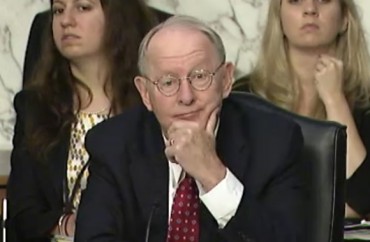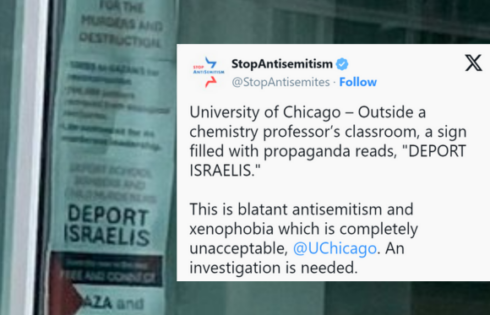
Critics go after procedures mandated by courts
Courts across the country have ordered colleges and universities, public and private, to give students accused of sexual misconduct due process and fair hearings that comport with the Constitution, state laws and their own policies.
The Senate Health, Education, Labor and Pensions Committee met Tuesday to consider a related question: the content of federal regulations that set rules for schools on adjudicating sexual misconduct allegations.
In their second hearing this Congress on the reauthorization of the Higher Education Act, committee Democrats warned that the Department of Education’s proposed Title IX regulation would harm “survivors.”
Committee Republicans were more concerned with giving schools clear rules that are legally binding, in contrast to the nonbinding guidance issued by the Obama administration, which has since been rescinded by Education Secretary Betsy DeVos*.
Though four of the five hearing witnesses were women, they also sharply disagreed on whether the proposed rules were fair and struck the right balance between accused students, who are typically male, and accusers, who are typically female.
The critics went after some practices that have been mandated by several courts, including the right to cross-examination in a live hearing.
MORE: Obama bureaucrats force Princeton to lower evidence standard
As Senator @PattyMurray and I update the Higher Education Act, our goal is to help universities have more certainty in dealing with sexual assaults so that the accused are treated fairly, and the accuser has a fair hearing. pic.twitter.com/57Qn3oEMx7
— Lamar Alexander (@SenAlexander) April 3, 2019
Obama officials believed their nonbinding guidance was binding
Chairman Lamar Alexander of Tennessee said he wanted to discuss “three key issues” raised by the department’s proposed Title IX regulation, noting that “the more we clarify” these issues “the more certainty and stability” will be given to universities.
The department recommends requiring cross-examination in a live hearing as part of a due-process revamp; not requiring colleges to investigate off-campus incidents if they don’t involve “the school’s own program or activity”; and narrowing the definition of sexual harassment from the Obama administration’s broad “unwelcome” standard, bringing it in line with Supreme Court precedent.
Alexander walked the hearing through the history of campus sexual assault, from Title IX and the Clery Act to the guidance letters sometimes used by the Department of Education, particularly in the Obama administration.
The letters don’t have the force of law, but “campuses sometimes consider them binding as law, and unfortunately department officials have, in the past, made the same mistake,” he said.
The 2011 and 2014 letters told schools to use the preponderance standard of evidence, known as “more likely than not,” and many believed it was not a suggestion, Alexander said. Universities that resisted – including Princeton – were forced to change their procedures by the department’s Office for Civil Rights.
DeVos’s regulatory rulemaking “allows extensive comment and discussion and would have the force of law when it is final,” the chairman said. But he also noted that public universities, which make up “80 percent of where undergraduates attend college,” must respect both the 14th Amendment and applicable state laws.
Alexander cited a 2017 article in the Cornell Journal of Law and Public Policy that found more than 100 lawsuits had been filed by students claiming they were denied due process in sexual misconduct proceedings.
Title IX needs to be “strengthened” and “not de-fanged,” Ranking Member Patty Murray of Washington said in her opening statement. One of her priorities in the HEA reauthorization is “ensuring our students are able to learn in an environment free from discrimination, harassment, and assault.”
DeVos’s proposal would “discourage students from coming forward” due to fears they wouldn’t be believed or taken seriously, Murray said, listing a series of testimonials by students on how they would be affected.
They oppose direct cross-examination in live hearings, which Murray claimed would mean that “survivors have to relive their trauma while being questioned by people who may be wholly unqualified to question survivors.” The Title IX proposal lets lawyers and other advocates conduct the cross-examination.
What’s needed is “a legislative solution to ensure students are able to get an education without being sexually harassed or assaulted,” she finished.
We cannot address campus sexual assault without listening to survivors. I hear you, I stand with you, and I’m going to keep fighting to stop what happened to you from happening to other students.
— Senator Patty Murray (@PattyMurray) April 2, 2019
Massachusetts Sen. Elizabeth Warren briefly spoke to introduce one of the witnesses, Harvard Law Prof. Jeannie Suk Gersen. Before leaving to attend other committees, Warren said that she “wanted to know more about the objections to weaken schools’ responsibilities under Title IX.”
She found it “disturbing” that schools would only be responsible for investigating incidents that either occur on campus or in a school-sponsored program or activity. She claimed that the proposal would ignore alleged victims at events such as off-campus fraternity parties, though recognized Greek organizations are still under their school’s jurisdiction.
Warren claimed without evidence that there was an “epidemic of assault on college campuses and around the country” and that “instead of listening,” the proposal would narrow and sweep assaults “under the rug.” The rulemaking included a 60-day comment window that was extended twice.
Keep in mind ‘plausible competing narratives and no independent witnesses’
Philadelphia lawyer Patricia Hamill, who represents accused students in Title IX proceedings, defended the proposed Title IX regulation on the grounds that her task as an attorney is to “advocate for fair, objective and reliable” proceedings.
The partner at Conrad O’Brien said this was not a partisan issue. Many current campus procedures are an attempt to “correct for decades of sexual assault claims not being taken seriously” or ignored, but “we must be careful not to allow current disciplinary processes to be marred by the sins of the past,” Hamill told senators.
Universities should not “presume that accused people are guilty, deprive them of the ability to defend themselves, and punish them without a full consideration of the facts from both parties’ perspectives,” she said. Title IX bans gender discrimination against accused men as much as accusing women, and often there are “plausible competing narratives and no independent witnesses or corroborating evidence” in any given dispute.
Hamill went on to state that “our nation’s fundamental values,” not just a regulatory rulemaking, require thorough and impartial investigations and “a fair hearing before impartial decision makers.”
MORE: Hamill represents student whose suicidal texts called ‘dating violence’
Highlights of the hearing:
–Sen. Smith thinking the issue is Title 10.
–Goss Graves opposing x-exam b/c lawyers for acc'd can't be trusted to ask "trauma-informed" questions.
–Dem senators refusing to ask Patricia Hamill any questions.https://t.co/iDH9PAPxp1— KC Johnson (@kcjohnson9) April 2, 2019
Universities pose a “threat” if they provide inadequate support for a survivor’s continued education, according to Fatima Goss Graves, president and CEO of the National Women’s Law Center.
She told senators that “one in five women and nearly one in 18 men are sexually assaulted,” citing an Association of American Universities survey in 2015 whose methodology has been questioned. She said that “unfair and harmful” processes can “deter survivors and witnesses from participating in their school’s investigations.”
Suk Gersen of Harvard Law, who along with colleagues has lobbied the Department of Education to make sexual-misconduct investigations more fair to accused students, nevertheless took issue with the proposed regulation’s definition of “hostile-environment sexual harassment.”
She said that “it would not cover conduct that is severe but not pervasive (such as a single act of rape), or pervasive but not severe (such as multiple, repeated, unwelcome comments on someone’s appearance).”
Both parties should receive written notice and full and fair access to gathered evidence, and decisionmakers should be neutral and independent, Suk Gersen advocated. Separate figures should fill the roles of investigator, adjudicator, and appellate body as well.
She agrees with the live-hearing requirement, letting parties bring counsel including a lawyer, presumption of innocence and the option of an informal resolution process, which the Obama administration discouraged.
But when questioned by Alexander, Suk Gersen defended the preponderance of evidence standard as appropriate as long as it’s combined with other fair procedures.
The proposed regulation allows preponderance but requires schools to use the same standard for both sexual and nonsexual allegations with the “same potential maximum sanction,” and for both faculty and student disciplinary proceedings. (Faculty typically get a higher evidence standard.)
MORE: Feminist law profs ask feds to raise due process standards in Title IX
We disagree with Patricia Hamill's suggestion that written examination disrupt the flow in #TitleIX hearings. From our experience representing #survivors in DC, written examinations can balance trauma w/ the need to collect info from the parties. #HEA #sexualassault #HandsOffIX
— Network for Victim Recovery of DC (@NVRDC) April 2, 2019
Colleges need ‘clear and unambiguous authority’ to punish off-campus conduct
Anne Meehan, director of governmental relations for the American Council on Education, which represents university presidents, agreed with Murray that live cross-examination could create a chilling effect on either party.
She said that “colleges and universities are not courts, nor should they be,” and can offer multiple ways for parties to respond that don’t involve live hearings or cross-examination.
There are many reasons why a survivor or an accused student might not “present well in a live setting,” Meehan said. Several courts have ordered universities – including private institutions – to use live hearings and get rid of so-called single-investigator proceedings, which would also be banned by the Title IX regulation.
In her testimony, Meehan said schools must have the ability to “address the conduct that violates their community standards, even if it occurs ‘off-campus’ or otherwise falls outside what the law requires campuses to do.”
The preamble language of the proposed regulation suggests that institutions would be able to pursue cases that occur off their campus, but the language “does not have the force of law,” she said. Incidents that happen in unrecognized fraternities or over summer break, for example, might not be punishable without “clear and unambiguous authority to pursue cases beyond what the law requires,” Meehan claimed.
She also urged the committee to “consider ways the federal government can help support campuses in their prevention efforts” so that fewer students end up in disciplinary proceedings.
Meehan’s written statement highlights such programs, including a Vanderbilt University theater program titled “True Life” that is put on during freshman orientation.
As important as it is to ensure fair disciplinary processes, the ultimate goal is to prevent sexual assault from occurring in the first place. A few examples of the work campuses are doing on prevention can be found here https://t.co/kW84mGcv1A #TitleIX #HEA
— ACE (@ACEducation) April 2, 2019
Jeff Howard, associate vice president for student life and enrollment at East Tennessee State University, explained how his public university has used “intake, investigation, and hearing” to protect students from conflicted university employees at each step.
During the intake stage, a trained staff member meets individually with the respondent and complainant, and shares resources and information with each student to make “informed decisions.” Students are also made aware of “interim support measures” such as “counseling, changing housing, class, and on campus work assignments.”
Howard noted that in “all but the most severe sexual assault cases,” both parties are offered the opportunity to meet with a trained mediator “to reach a mutually agreed conclusion to the matter in lieu of an investigation.”
The investigation stage goes forward if mediation is not an option, and two “trained investigators” review the complaint, in which both parties can supply investigators with a “written statement and any additional information they wish to provide.”
ETSU has two full-time investigators and a “pool of fifteen trained professional staff members who assist with student complaints,” Howard said.
While written notes are provided from investigators’ meetings with parties, they do not apparently include transcripts or audio recordings, meaning that parties are relying on an investigator’s judgments of what to include.
If investigators find a policy violation, the matter moves on to the University Judicial Board for a live hearing. Parties are given copies of all materials that the board will consider, and they can question one another and witnesses.
Though parties can choose an advisor to help them, it’s not clear whether they can bring a lawyer, since “legal representation” is mentioned explicitly in a different form of proceeding for grave penalties.
“Details such as screening the complainant and respondent from viewing one another in the hearing room are arranged in advance,” Howard wrote.
Students facing suspension or expulsion can also choose a proceeding governed by the state Uniform Administrative Procedures Act, “a more legalistic and lengthy process involving legal representation and an administrative law judge,” Howard wrote. This option is not often chosen by students, he claimed.
MORE: Court rulings force Cal State to slam brakes on Title IX proceedings
IMAGE: Senate HELP Committee screenshot
Like The College Fix on Facebook / Follow us on Twitter






Please join the conversation about our stories on Facebook, Twitter, Instagram, Reddit, MeWe, Rumble, Gab, Minds and Gettr.